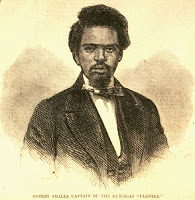The Improbable Story of Robert Smalls, Beaufort Hero
 @font-face { font-family: "Cambria";}p.MsoNormal, li.MsoNormal, div.MsoNormal { margin: 0in 0in 0.0001pt; font-size: 12pt; font-family: "Times New Roman"; }div.Section1 { page: Section1; }This is a piece of history I wish I could've incorporated into Beaufort 1849 but the timing just wouldn't work.
@font-face { font-family: "Cambria";}p.MsoNormal, li.MsoNormal, div.MsoNormal { margin: 0in 0in 0.0001pt; font-size: 12pt; font-family: "Times New Roman"; }div.Section1 { page: Section1; }This is a piece of history I wish I could've incorporated into Beaufort 1849 but the timing just wouldn't work. Robert Smalls began his life in 1839 in a slave cabin in Beaufort. In his teens he was sent to Charleston and hired out to work for wages that his owner would collect, a not uncommon practice. He worked in a hotel, as a lamplighter and then on the wharves and docks of Charleston. He married, had children, and eventually worked his way up to a wheelman, learning to pilot the Charleston harbor. Though undeniably constrained by the realties of slavery, his life had much more scope for initiative and resourcefulness than the average slave.
Now comes the exciting part. During the Civil War, Smalls was assigned as wheelman on the steamer, Planter, an armed dispatch and transport boat used by the Confederacy. On the night of May 13, 1862, the white crew decided to spend the night on shore, probably to amuse themselves with the distractions Charleston had to offer. Robert Smalls and the seven other slave crewmen took the opportunity to strike. With a Confederate flag flying and Smalls dressed in a captain's uniform, at 3 a.m. Smalls backed the boat out of her slip and made way to a nearby wharf where the families of Smalls and other crew members were hiding in wait. After loading the contraband passengers, Smalls brazenly chugged the boat past the five Confederate forts guarding the harbor. Then, taking down the Confederate flag and hoisting a white sheet in its stead, he made a beeline for the blockading Federal fleet just beyond. Luckily the first US Navy ship he encountered noticed the sheet moments before it was set to open fire on the renegade vessel.
Smalls turned Planter over to the U.S. Navy, along with its cargo of artillery and explosives. Even more valuable, he handed over a codebook that revealed Confederacy secret signals and placement of mines and torpedoes around Charleston harbor. In addition, due to his comprehensive familiarity with the area, Smalls was able to offer extensive information about the harbor's defenses.
The North was delighted! Smalls was an overnight hero and media sensation in Northern papers. Congress passed a bill awarding Smalls and the other seven crewmen $1500 in prize money for the captured vessel. Two weeks after the daring escape Smalls even met Abraham Lincoln himself, who was impressed by Smalls's account of his exploits. Smalls's deeds became a major argument for allowing African Americans to serve in the Union Army, and Smalls himself served as a pilot for the Union forces. In 1863 Smalls became the first black Captain of a vessel in the service of the United States.
This is just the beginning of Smalls's accomplishments, but the rest will have to wait for another blog post. I'll just observe that as much as Smalls was lauded by the North, he was in equal parts reviled by the South. In a war, one side's hero is almost necessarily the other side's varlet.
Published on April 03, 2011 11:33
No comments have been added yet.



